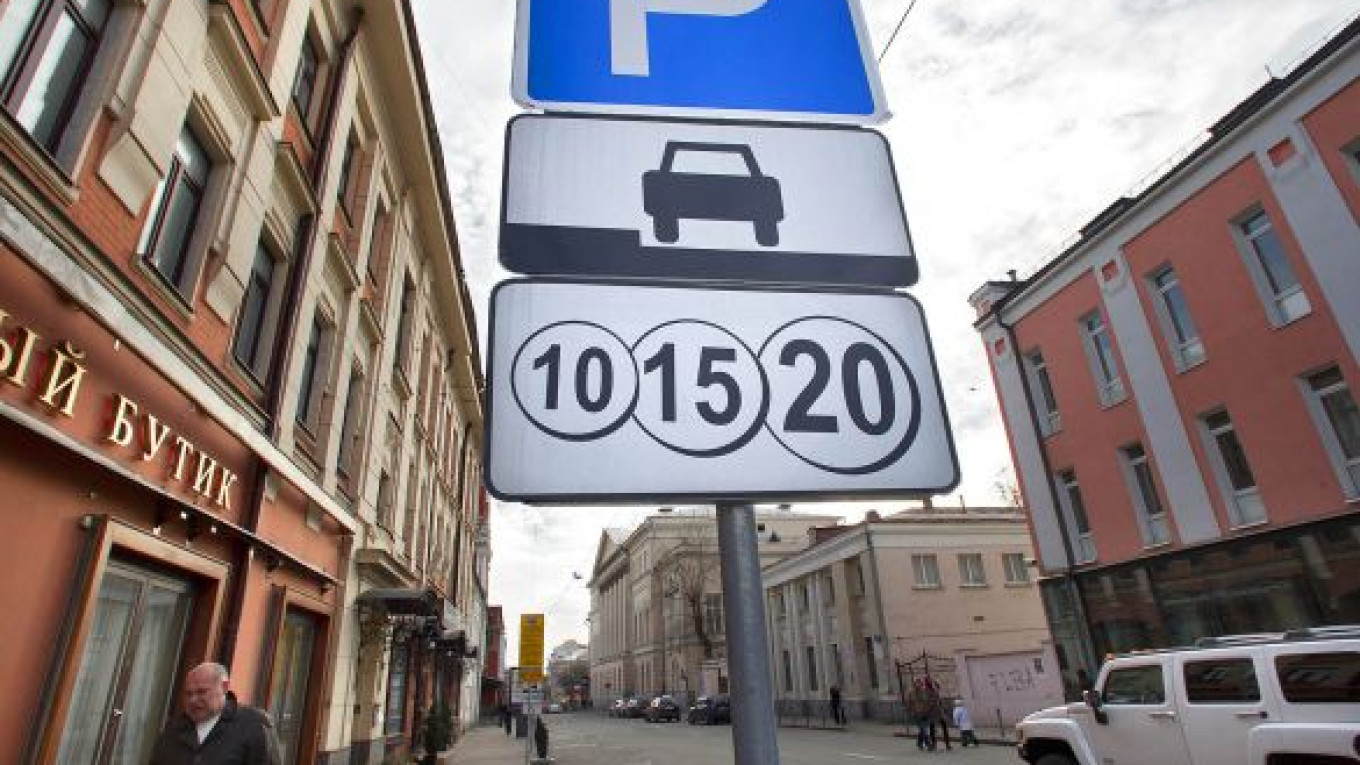Yelena, a freelance consultant who lives in central Moscow, was trying to get the hang of the city's first automated paid-parking system. And it wasn't exactly going to plan.
The text message she sent based on the instructions of the friendly orange-jacketed volunteer who was explaining to baffled drivers how the new system works was promptly declined by the supposedly automated system.
After a little shuffling around, she managed to pay her 100 rubles ($3) for two hours, using a credit card at a newly installed payment terminal not far from Dmitrovsky Pereulok, where she had parked on Friday afternoon.
Drivers in the capital who want to park on 21 streets in a small wedge of the city center around Ulitsa Bolshaya Dmitrovka, Ulitsa Petrovka and Ulitsa Kuznetsky Most have been obligated to pay 50 rubles an hour since Nov. 1.
The pilot project is the city's first attempt to get parking revenue without human intervention and is a tentative step toward discouraging drivers from bringing their cars into the overcrowded city center.
There have been periods in the past when attendants roamed sidewalks collecting fees for parking, but the approach was open to abuse, and City Hall frequently did not receive the returns it expected.
The project has already generated more than 700,000 rubles: about 434,000 rubles via SMS payments and about 300,000 rubles from prepaid cards, Sergei Marinichev, the administrative director of Moscow Parking Places, the company City Hall set up to run the endeavor, said at a news conference Friday.
The idea is simple: If drivers know they have to pay to park, they will be less likely to bring their cars into the city center, and if they do drive in, they are likely to spend less time on the crowded streets.
In the two years since then-President Dmitry Medvedev tasked incoming Moscow Mayor Sergei Sobyanin with reducing the capital's legendary traffic jams, the situation on the streets has gotten worse.
Figures published last week by Geolife, a think tank, revealed that average speeds on the capital's roads are decreasing at a rate of 5 percent per year and on some streets by as much as 15 percent.
The solution is, at least theoretically, tech-friendly. The supposedly easiest ways to pay are to send a text message with the license-plate number and the code of the parking zone or to use one of the handful of prepay terminals, which take credit cards and cash.
But there are teething problems. Some drivers have had their SMS message rejected, and as Marinichev acknowledged, several of the terminals refused to process credit cards during the past week.
Earlier in the trial, a failure of the cell-phone network forced drivers into long lines to use one of the few payment terminals, and many complained that no instructions for using the terminals were available.
Others complained of overzealous traffic inspectors roaming the streets looking for drivers to fine the 2,500 rubles for nonpayment.
But Marinichev insisted that the project has been moderately successful thus far, easing traffic loads on the streets where the rules were in play by an average 2 percent, and even 4 percent on the first day. He did not explain how he came up with those figures.
While Marinichev stressed that such systems have worked in other cities, such as Paris and New York, he cannot escape the fact that this is new ground for Moscow.
Accordingly, the authorities have had to tread carefully. There were public meetings with local residents before the experiment began, and City Hall even sent a small army of volunteers in bright-orange jackets whose job is to explain to drivers that they have to pay and to instruct them how to carry out the transaction.
"The reaction? Varied," said Georgy, a 27-year-old volunteer who has been doing shifts near the General Prosecutor's Office on Ulitsa Petrovka for more than a week. "Some think it is a good idea; they think it will cut congestion. Others have different opinions."
Asked if anyone had expressed anger, he laughed and said "yes, and not only that."
The project has faced particular hostility from downtown residents asked to pay the standard rate for parking outside their own apartments.
Leonid Antonov, a city-center resident who started a campaign to create special rates for people living in the zones, has accused City Hall of "holding citizens hostage."
But others are more appreciative of the initiative. Once she had shrugged off the difficulties she encountered in her first attempt to pay, Yelena, the consultant, expressed unequivocal support for the measure.
"Having lived in Switzerland for several years, I am used to a normal parking regime and being able to find a place to park," she said. "This will encourage people not to leave their cars in one place for so long. And the price is absolutely fine."
Related articles:
A Message from The Moscow Times:
Dear readers,
We are facing unprecedented challenges. Russia's Prosecutor General's Office has designated The Moscow Times as an "undesirable" organization, criminalizing our work and putting our staff at risk of prosecution. This follows our earlier unjust labeling as a "foreign agent."
These actions are direct attempts to silence independent journalism in Russia. The authorities claim our work "discredits the decisions of the Russian leadership." We see things differently: we strive to provide accurate, unbiased reporting on Russia.
We, the journalists of The Moscow Times, refuse to be silenced. But to continue our work, we need your help.
Your support, no matter how small, makes a world of difference. If you can, please support us monthly starting from just $2. It's quick to set up, and every contribution makes a significant impact.
By supporting The Moscow Times, you're defending open, independent journalism in the face of repression. Thank you for standing with us.
Remind me later.


